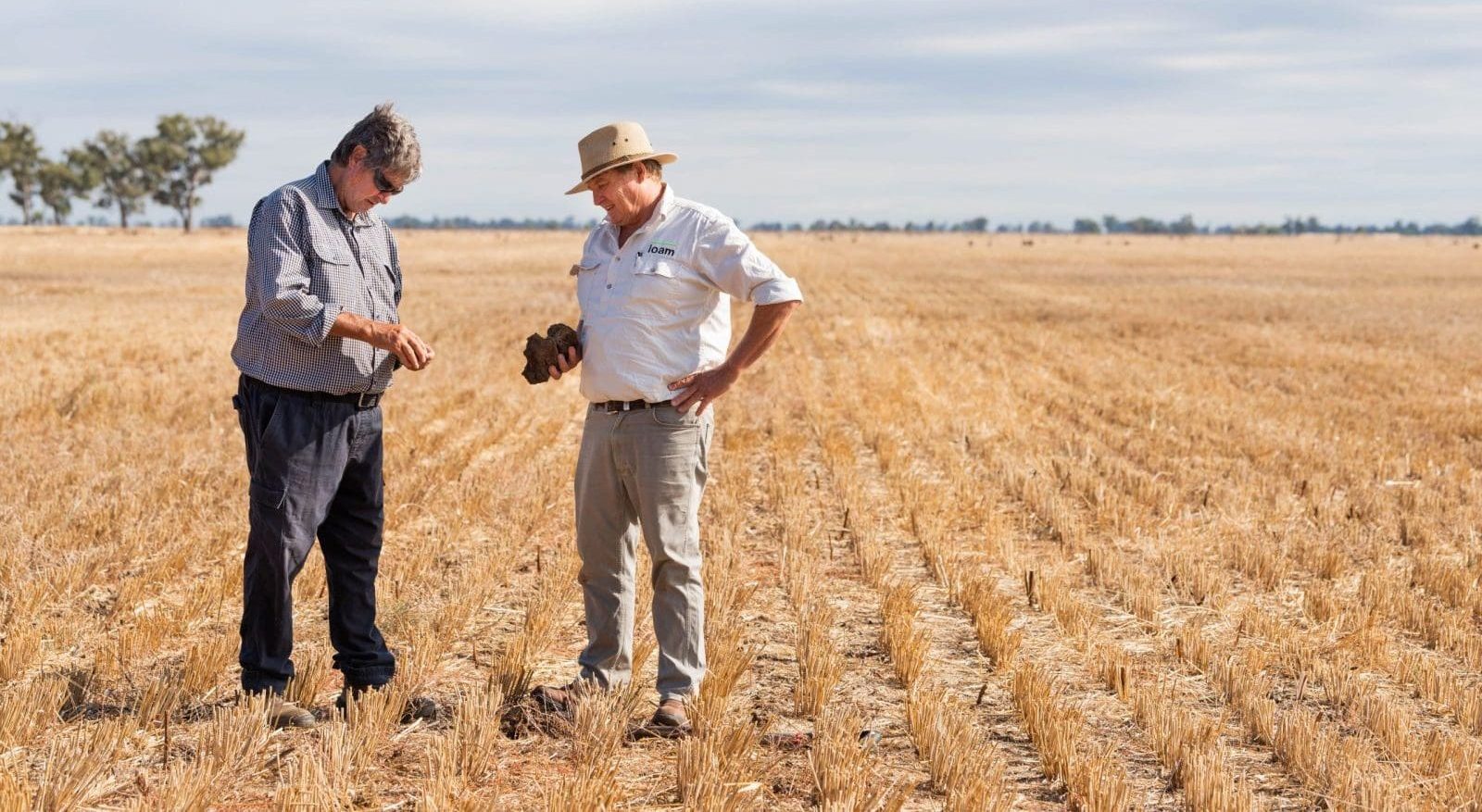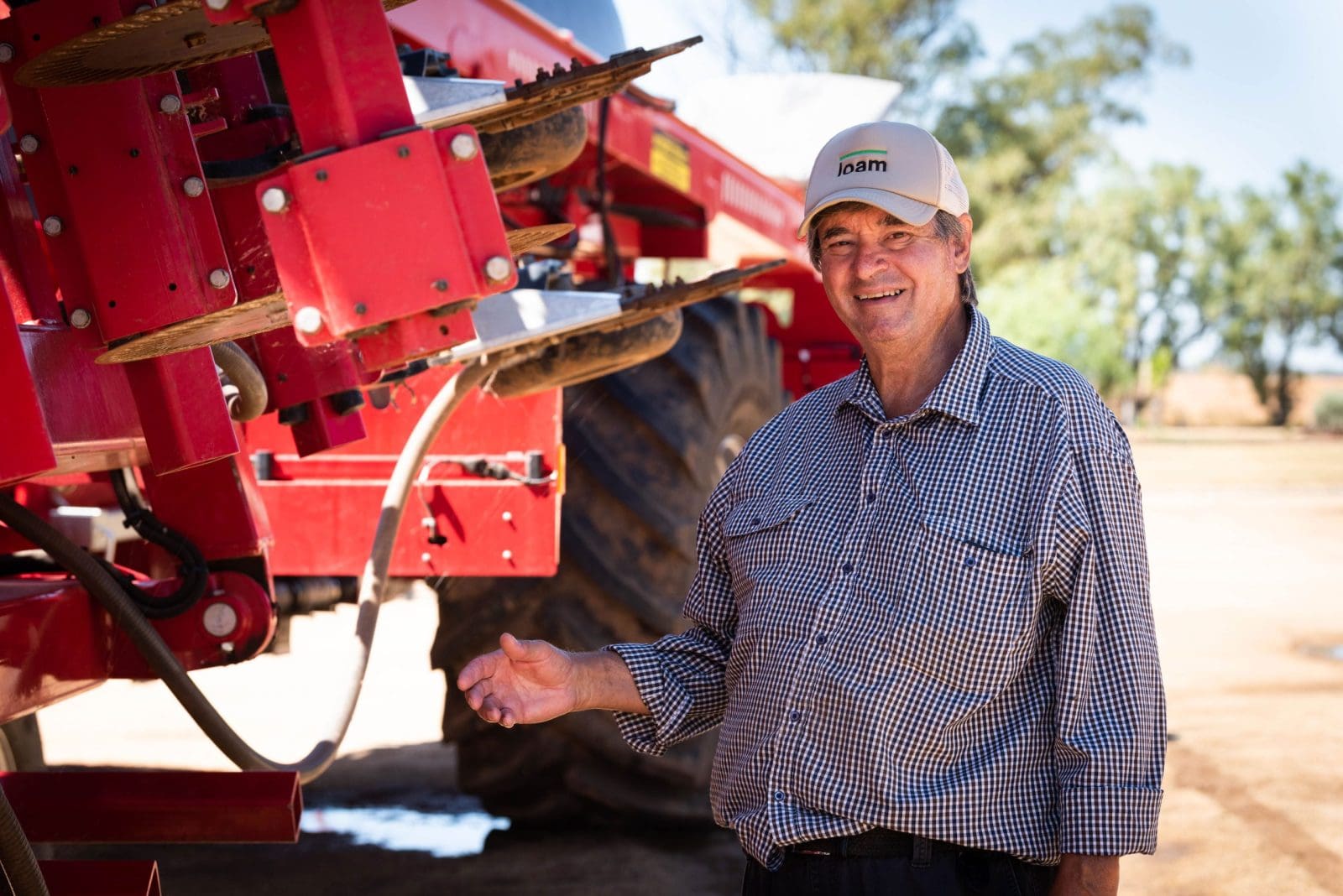
Steve Nicholson and Loam Bio co-founder and head of global agronomy Guy Webb on the Nicholsons’ farm at Pinnacle. Photo: Loam Bio
THE INTRODUCTION of beneficial fungi is boosting yields and building soil carbon on the Nicholson family’s 4000ha mixed-farming operation at Pinnacle, south of Forbes in the Central West of New South Wales.
It has expanded from a 320ha farm purchased in 1999 by Steve Nicholson and family, including three sons who now run the Eniver operation spread over country which ranges from deep and heavy grey sodic clays to gravelly ironbark ridges.
“It’s a classic mixed farm; we grow wheat, barley and canola in rotation, and on our least productive country, we grow multi-species pasture and run sheep,” Mr Nicholson said.
The use of non-mycorrhizal endophytic fungi developed into the CarbonBuilder product by Orange-based business Loam Bio has been the latest addition to the Nicholsons’ recipe for soil improvement.
Soils top priority
Mr Nicholson’s background is as an agronomist with the NSW Department of Primary Industries based at Nyngan, and then managing the Trangie Research Station.
Post DPI, Mr Nicholson and family were looking for somewhere to have a red-hot go at mixed farming, and a property in the Pinnacle district with an annual average rainfall of 620mm came up as the ideal place to start.
“I’ve always thought there was a lot of money to be made out of agriculture if you did it right, so we tried to do it right.”
“In our first years at Pinnacle Mountain from 1999 to 2002, you could grow a good average crop; then the Millennium Drought came.
“We sat down and said: ‘Right; let’s do this using the best science in the best way.”
It involved improving drainage to avoid waterlogging through the redesigning of paddocks, and cleaning out dams, with greater productivity from the heavy sodic soils an early aim.
“We started with canola, wheat, barley, and oats, and the canola crops were terrible; we were still bumping along the bottom.”
Soil testing revealed organic carbon levels had collapsed to around 0.01pc, not surprising on country which had been cropped intensively since the horse-drawn days.
“We knew soil health was a limiting factor, and we quickly realised you had to further stimulate the biome in the soil.”
The purchase of a Shearer minimum-till planter helped the Nicholsons turn a corner, as did the application of lime and gypsum, and the use of compost they produce for their own use and for sale through their Topsoil Organics business in Forbes.
“Then we had 1.8pc soil organic carbon and beautiful fluffy soil; 3-4t/ha cereal yields were quite average, but we knew there was more.”
“Our soils were generally in a reasonable condition, but we’d plateaued.”
Since 2019, Loam Bio has been developing products that can add carbon to agricultural soils, and the Nicholsons were early adopters, with Loam Bio’s presence in Forbes the initial connection.
Mr Nicholson said the use of Loam Bio’s CarbonBuilder seed inoculum has driven a lift in average cereal yields to more like 5-6t/ha, and for a modest cost.
“It’s less than what we spend on tyres; for an average crop, it’s about 4pc of input costs.”
The Nicholsons are awaiting results on their soil-carbon levels, with a lift expected since the introduction of CarbonBuilder.

Steve Nicholson with the family’s 13.5m Horsch planter.
The CarbonBuilder seed coating comes in powder form, and allows the seedling to fix carbon in the soil in a stable form, as quantified in the results of recent research led by a team from Western Sydney University.
After a dusty growing season last year, the Nicholsons are happy with their results.
“We had decile five rainfall from harvest to harvest, and we got a 5-6t/ha average for most of our cereals.”
Place for sheep
Sheep were reintroduced to the operation in 2018, which now runs a self-replacing flock of 3000 Merino ewes plus followers.
“We destocked for nearly eight years so we could fix the farm.”
Maiden and middle-aged ewes are joined to Merino rams from Russell and Jenny Jones‘ Darriwell Stud at Trundle.
“Darriwell sheep are big and plain-bodied, and they do well for us.”
The oldest ewes are joined to Suffolk rams, meaning that around one-quarter of each year’s lambs are first crosses.
“We have our own feedlot for up to 250 lambs, but feedlotting is only done when there’s an economic advantage in it.
“If there’s more money in selling grain and selling the lamb as is, that’s what we’ll do.”
Mr Nicholson said while sheep only generate about 10pc of the operation’s income, they are important in management.
“Sheep are used to graze country not in cropping, such as remnant vegetation and creek lines.
“Some people might think you shouldn’t graze these areas, but using big numbers of sheep to graze country for short periods of time can help to get all that biodiversity going.”
Season permitting, sheep can also graze on Eniver’s winter crops in the colder months, and keep down weeds in stubble after harvest.
With ploughing not an option the minimum tillers wish to entertain, Mr Nicholson said grazing is an important tool to have available.
“Livestock gives you flexibility which you may need if you have an overriding problem like herbicide-resistant ryegrass.”
Carbon options under investigation
Mr Nicholson said the building up of soil carbon in their country, half of it theirs and the rest leased, has given them the option to generate Australian carbon credit units (ACCUs), but insetting them may be a more appealing options.
“One reason for our soil-carbon project is to get carbon credits.
“First and foremost, it’s to use them as offsets to become carbon neutral.
“We’re looking at who will independently verify them, so there’s no chance of greenwashing.”
Mr Nicholson said companies all over the world setting their own carbon-neutral targets will be the ones the family wants to talk to, and from the price-maker’s rather than price-taker’s seat.
“First you have to prove you can grow the carbon, and then you can say: ‘This is what we want for it’.”
With 5000t of on-farm storage and all-weather access, Eniver can load a truck “with five minutes’ notice”, a further sweetener for consumers or traders looking for grain with carbon-neutral credentials.
Unlike sectors including mining, energy, and transport, Mr Nicholson said agriculture has a big advantage.
“Ag is the only industry within our economy that can be internally carbon neutral.”
Mr Nicholson does not see a day when synthetic fertiliser can be bypassed at Eniver, although the property’s improving soil carbon may see a reduction in volume applied.
“You can build soil carbon, but if you’re management is not spot on, it will go.”
“Everyone’s got to realise you still have to do correct agronomy, and nothing will substitute for artificial fertiliser.
“There’s no way of growing 6t/ha cereals at Forbes without them, but how do you minimise the amount of fertiliser you use?
“It costs a lot, and you don’t want it to be leaching.”
The operation’s use of fertiliser these days is discretionary rather than indiscriminate, in stark contrast to Mr Nicholson’s early days as a consultant.
“I was brought up as an agronomist to say: ‘Throw another bag of fertiliser at it and go to the pub’.”
Eniver has this year planted faba beans, which have never before stacked up as a profitable crop, but could do now that the pulses have the potential to fix nitrogen in a more stable system.
“If you fix the soils so the root biomass is bigger, you’ve got less dependence on feeding.”
The Nicholsons use herbicides, and will burn paddocks if that is the only option to control an infestation of herbicide-resistant ryegrass.
To conserve soil and moisture, one rule is paramount.
“We won’t allow paddocks to drop below 90pc groundcover.
“The take-home message is that none of that is a silver bullet; we are systems farmers.”
“You have to do lots and lots of little things, and they might add up to 1-2pc each.”
Grain Central: Get our free news straight to your inbox – Click here

HAVE YOUR SAY